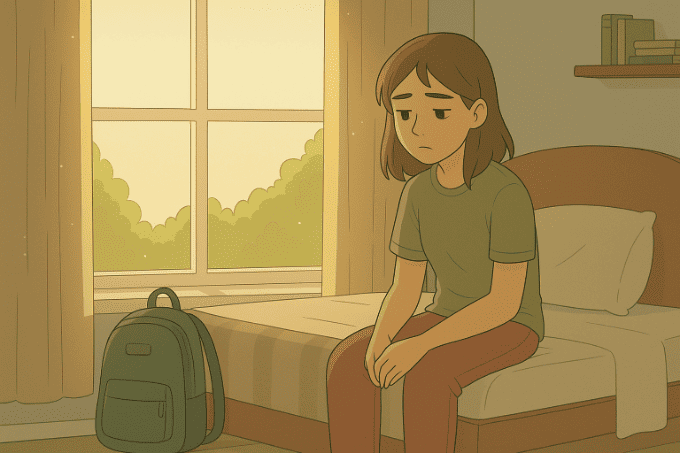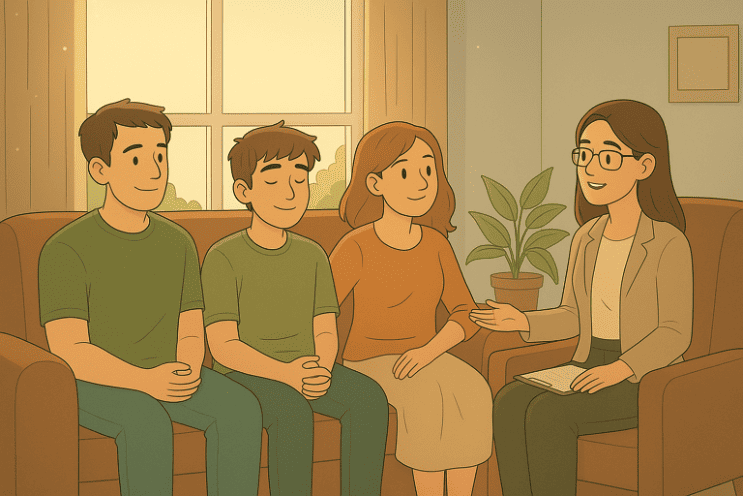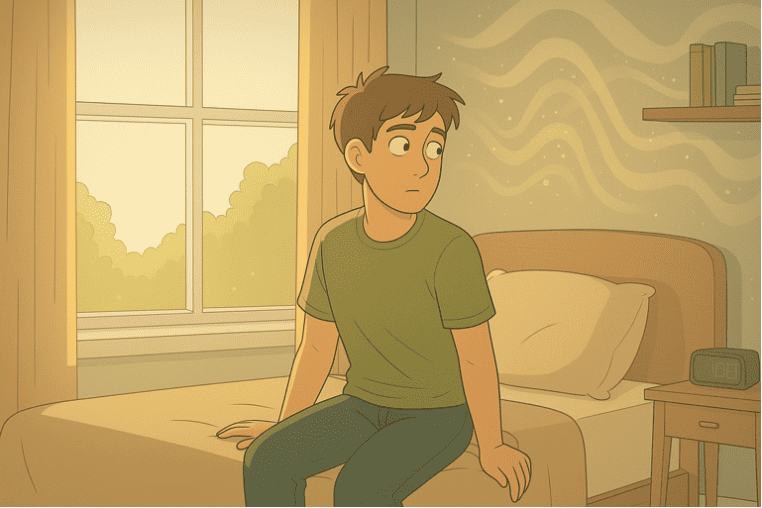Key Takeaways
- Early detection is crucial because untreated schizophrenia can affect brain development, social functioning, and long-term outcomes.
- Sudden social withdrawal or loss of interest in friends, family, or activities can appear long before more obvious symptoms.
- Declining school performance, memory issues, and disorganized thinking often signal cognitive changes that need attention.
- Emotional changes like flat affect, inappropriate responses, irritability, or loss of enjoyment may indicate early schizophrenia.
- Professional support is essential. At Mission Prep, teens receive residential, outpatient, or telehealth care with evidence-based therapies, family involvement, and academic support in safe, structured environments.
Why Early Detection of Schizophrenia in Teens Matters
For schizophrenia, time is literally brain tissue. Untreated psychosis can cause progressive brain changes, with each episode potentially adding cumulative damage. Early intervention doesn’t just ease current distress, but it also helps protect a teen’s neurological development and future functioning.
Most people with schizophrenia experience their first symptoms in adolescence or early adulthood, typically between ages 15–19 for males and 20–24 for females. This period overlaps with crucial stages of brain growth and identity formation, making accurate recognition both vital and complex.
The Critical Window for Intervention
Studies show that shorter durations of untreated psychosis (DUP) lead to far better outcomes. Teens who receive care within 6–12 months of symptom onset have improved recovery rates, fewer hospitalizations, and stronger long-term functioning. These comprehensive treatments combine low-dose medication, CBT, family education, and academic or work support, addressing the illness holistically before symptoms become entrenched.
Common Misdiagnoses and Delayed Treatment
Early signs of schizophrenia are often mistaken for typical teen behavior, substance use, or mood disorders like depression and anxiety. This leads to an average diagnostic delay of 1–2 years, precious time during which the condition can worsen. Many teens also hide their symptoms out of fear or confusion, lacking the words to describe unusual perceptions or thoughts. As a result, they may withdraw socially or turn to harmful coping strategies like substance use.
Mission Prep Healthcare specializes in mental health treatment for teens aged 12-17, offering residential and outpatient programs for anxiety, depression, trauma, and mood disorders. Our therapies include CBT, DBT, EMDR, and TMS, tailored to each adolescent’s needs.
With a structured, supportive environment, we integrate academic support and family involvement to promote lasting recovery. Our goal is to help teens build resilience and regain confidence in their future.
Early Warning Signs of Schizophrenia in Teens
Recognizing early changes in behavior, thinking, or emotions can make a significant difference in supporting teens at risk of schizophrenia. While these signs may seem mild or easy to overlook, they often emerge months or even years before more obvious symptoms appear. Understanding what to watch for can help parents, teachers, and caregivers seek timely professional guidance.

Awareness and timely support can prevent symptoms from escalating into a full psychotic episode.
1. Changes in Social Behavior and Withdrawal
One of the earliest red flags is a sudden decline in social engagement. A once-active teen who withdraws from friends or activities may be showing more than normal mood changes. This withdrawal often appears months or even years before other symptoms.
Loss of Interest in Friends and Activities
Persistent disinterest in hobbies, sports, or social groups may signal something deeper than changing interests. Teens may feel disconnected from peers or find social interaction confusing, overwhelming, or even threatening.
Isolation from Family Members
Teens might also pull away from family, spending long hours alone or avoiding gatherings. Parents often describe them as “behind a glass wall”, physically present but emotionally distant. This isn’t typical teenage independence but a marked change in connection that warrants concern.
2. Declining School Performance
A drop in academic performance is another early sign, often tied to cognitive changes rather than effort. Research shows these difficulties can appear 2 to 4 years before clear psychotic symptoms.
Trouble with Concentration and Memory
Teens may lose focus easily, forget what they just read, or struggle to follow instructions. Working memory, holding and processing short-term information, often becomes impaired, frustrating students who once performed well.
Difficulty Organizing Thoughts
Assignments and speech may become disjointed or hard to follow. Writing can appear tangential or illogical, reflecting changes in thought organization.
Talking to Teachers About Changes
Arrange a private discussion with teachers to compare observations at home and school. Ask about participation, peer interaction, and quality of written work. Keeping records of these changes can support early evaluation.
3. Unusual Thought Patterns and Speech
Before delusions or hallucinations emerge, subtle disruptions in thinking may appear. Teens might express odd ideas, connect unrelated events, or hold beliefs that seem irrational.
Magical Thinking and Odd Beliefs
They may assign special meaning to everyday events or believe they receive messages from the media. These convictions often cause distress or dysfunction, distinguishing them from typical teenage imagination.
Disorganized Communication
Speech may wander between unrelated topics, include strange phrases, or feature made-up words. Writing can seem grammatically correct but illogical, an early sign of thought disorganization.
4. Emotional Changes
Emotional expression can change significantly in early schizophrenia. Teens may appear emotionally flat or show sudden, unpredictable reactions that don’t match the situation.
Flat Affect and Emotional Detachment
Expressions and tone may become noticeably muted. A teen may no longer laugh at jokes or respond warmly to affection, often seeming distant or “numb.”
Inappropriate Emotional Responses
Some teens laugh at distressing situations or remain expressionless during emotional moments, showing a disconnect between external events and inner emotional response.
Loss of Enjoyment and Irritability
They may stop enjoying favorite pastimes and seem easily frustrated. This emotional blunting, known as anhedonia, can accompany mood swings and restlessness, making it hard to distinguish from depression.
5. Decline in Personal Care
A marked decline in grooming or hygiene may indicate deeper cognitive or motivational changes. This isn’t typical adolescent neglect, as it’s often a sign of diminished self-awareness.
Changes in Hygiene Habits
Teens might neglect showering, brushing teeth, or wearing clean clothes. Bedrooms and belongings can become unusually messy, showing reduced attention to personal or environmental order.
Sleep Disturbances
Irregular sleep patterns, staying up all night, excessive daytime sleepiness, or sleeping in fragmented cycles are common. Nighttime can heighten anxiety, intrusive thoughts, or sensory distortions, further disrupting rest.
6. Unusual Perceptual Experiences
Before hallucinations develop, many teens notice subtle distortions in how they see, hear, or feel the world around them. These sensations may be confusing but not yet fully psychotic.
Early Sensory Changes
Lights may appear brighter, sounds sharper, or familiar objects oddly distorted. These experiences often leave teens unsettled or fearful but unsure how to explain them.
Feelings of Depersonalization
Some teens describe feeling detached from themselves or as though their surroundings aren’t real. They might say, “It feels like I’m in a dream” or “I’m watching my life happen.” These sensations can be early indicators of perceptual instability.
How to Approach Your Teen If You Notice These Signs
Discussing potential schizophrenia requires sensitivity and care. Your approach can determine if your teen feels safe enough to share their experiences and be receptive to seeking help. Many symptoms are confusing or frightening, so reassurance, not judgment, is essential.
The goal isn’t to diagnose but to open communication and convey unconditional support. Choose calm moments for these conversations, and avoid addressing symptoms during distressing episodes or conflicts.
Creating a Safe Space
Pick a private, comfortable setting without distractions. Share observations using “I” statements, such as, “I’ve noticed you’ve been having trouble sleeping lately,” rather than accusatory language. Show genuine curiosity and invite discussion without jumping straight to concerns about illness.
Phrases to Use and Avoid
Helpful statements include:
- “I’ve noticed some changes lately and wondered how you’ve been feeling.”
- “Sometimes talking about unusual experiences can help.”
- “I care about you and want to understand what you’re going through.”
Avoid phrases that judge or label, such as:
- “Snap out of this.”
- “You’re just doing this for attention.”
- “You’re acting crazy.”
Focus on understanding their perspective, expressing support, and creating an environment where they feel heard and safe.
Next Steps: Getting Professional Help

Open and supportive communication helps teens feel safe discussing confusing or distressing experiences.
If conversations with your teen reveal concerning symptoms, seeking professional evaluation is essential. Early intervention can improve outcomes, reduce the risk of full psychosis, and support social and academic functioning.
Starting with your pediatrician or family doctor provides a comfortable entry point. They can perform initial screenings, rule out medical conditions, and provide referrals to mental health specialists. Many communities also offer early psychosis intervention programs specifically for adolescents showing early warning signs.
Types of Mental Health Providers
Child and adolescent psychiatrists specialize in diagnosing and treating teens, including prescribing medication if needed. They understand how schizophrenia presents in adolescents and the unique developmental challenges involved. Evaluations often include interviews, standardized assessments, and sometimes neuropsychological testing.
What to Expect During Initial Evaluations
Assessments typically involve multiple appointments. Clinicians gather histories from both parent and teen, conduct structured interviews, and may request input from teachers or other adults. They screen for conditions with similar symptoms, such as bipolar disorder, severe anxiety, autism spectrum disorders, or substance use. Sharing comprehensive information about family mental health, developmental milestones, life stressors, academics, and social relationships improves assessment accuracy.
Treatment Options That Work
Early intervention programs emphasize coordinated, team-based care rather than relying on medication alone. Coordinated Specialty Care (CSC) combines low-dose medication, individual therapy, family education, and support, along with educational or vocational services. This approach addresses multiple areas affected by schizophrenia and supports the entire family.
Therapies like Cognitive Behavioral Therapy (CBT) are especially effective for adolescents, helping them reality-test unusual experiences, manage distressing symptoms, and maintain school and social life. Medication decisions should be carefully guided by a specialist, using the lowest effective dose of second-generation antipsychotics, with regular monitoring for side effects.
Research shows that early intervention programs can reduce hospitalizations and significantly improve long-term functioning, highlighting the importance of timely professional care.
Supporting Teens Through Expert Care: Mission Prep
When you notice early signs of schizophrenia in your teen, getting the right support can make all the difference. At Mission Prep, we provide specialized care for teens aged 12–17, helping them process mental health challenges in safe, structured, and home-like environments. Our programs focus on emotional safety, resilience, and long-term recovery, ensuring that teens feel understood and supported every step of the way.

With the right care and environment, recovery is not only possible, it’s within reach.
What We Offer at Mission Prep:
- Residential, Outpatient, and Telehealth Programs: We meet teens where they are, offering 24-hour residential care or step-down programs that support ongoing growth.
- Evidence-Based Therapies: Our team delivers CBT, DBT, Eye Movement Desensitization and Reprocessing (EMDR), and Transcranial Magnetic Stimulation (TMS) in ways designed to engage teens while addressing anxiety, depression, trauma, mood disorders, and technology dependence.
- Family-Centered Care: We involve families through weekly therapy, regular updates, and structured transition plans so the skills learned in treatment carry over into daily life.
- Academic Support: Our programs coordinate with schools to help teens continue learning without interruption.
- Safe, Home-Like Environments: Our licensed homes provide semi-private rooms, shared meals, and structured routines to create comfort, stability, and a sense of belonging.
We combine proven therapeutic methods with innovative interventions to equip teens with sustainable tools for managing stress, building life skills, and strengthening social and emotional resilience. By giving teens a voice in their care, we empower them to actively participate in their recovery and grow confidently into the future.
Frequently Asked Questions (FAQs)
How do I know if my teen is just going through a phase or showing signs of schizophrenia?
Typical teenage phases are brief, context-specific, and don’t significantly affect life. Schizophrenia signs persist, worsen over time, impair school, social life, and daily functioning, and often include unusual thoughts or perceptual experiences.
Can childhood trauma cause schizophrenia in teens?
Trauma doesn’t directly cause schizophrenia but can increase risk in genetically vulnerable teens. Chronic stress may affect brain development and stress responses, but many trauma survivors never develop schizophrenia, and some affected teens have no trauma history.
What’s the difference between bipolar disorder and schizophrenia in adolescents?
Bipolar disorder involves episodic mood disturbances with normal functioning between episodes, while schizophrenia affects thought, perception, and social functioning persistently. Psychotic symptoms in schizophrenia can occur independently of mood and are often more unusual or bizarre.
Should I be concerned if my teen talks about unusual experiences?
Yes, unusual perceptual experiences or beliefs can signal early schizophrenia, especially if combined with social withdrawal or cognitive changes. Early evaluation by a mental health professional is recommended.
Can therapy help my teen if schizophrenia is suspected?
Absolutely. Evidence-based therapies such as CBT, family therapy, and skill-building interventions can improve coping, reduce distressing symptoms, and support social and academic functioning. At Mission Prep, we combine these proven approaches with personalized care in a supportive, teen-focused environment to help adolescents process early symptoms and build lasting resilience.
















